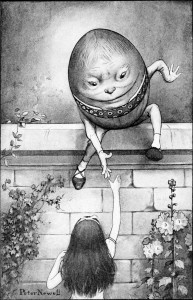A present-day mathematical logician , Rosser, in Logic for Mathematicians, McGraw-Hill, 1953, p. 11) writes:
[The mathematician] should not forget that his intuition is the final authority, so that,
in case of irreconcilable conflict between his intuition and some system of… logic, he
should abandon the … logic. He can try other systems of… logic, and perhaps find
one more to his liking, but it would be difficult to change his intuition.
*********************************************************
“In 1931, the Czech-born mathematician Kurt Godel demonstrated that within any given branch of mathematics, there would always be come propositions that couldn’t be proven either true or false using the rules and axioms of that mathematical branch itself. You might be able to prove every conceivable statement about numbers within a system by going outside the system in order to come up with new rules and axioms, but by doing so you will only create a larger system with its own unprovable statements. The implication is that all logical systems of any complexity are, by definition, incomplete. Each of them contains at any given time, more true statements that it can possibly prove according to its own defining set of rules.
Godel showed that within a rigidly logical system such as Russell and Whitehead had developed for arithmetic, propositions can be formulated that are undecidable or indemonstrable within the axioms of the system. That is, within the system, there exist certain clear-cut statements that can neither be proved or disproved. Hence, one cannot, using the usual methods, be certain that the axioms of arithmetic will not lead to contradiction. It appears to foredoom hope for mathematical certitude through use of obvious methods.
He proved it impossible to establish the internal logical consistency of a very large class of deductive systems – elementary arithmetic, for example – unless one adopts principles of reasoning so complex that their internal consistency is as open to doubt as that of the systems themselves … Second main conclusion is … Gödel showed that Principia, or any other system within which arithmetic can be developed, is essentially incomplete. In other words, given any consistent set of arithmetical axioms, there are true mathematical statements that cannot be derived from the set… Even if the axioms of arithmetic are augmented by an indefinite number of other true ones, there will always be further mathematical truths that are not formally derivable from the augmented set. “ (http://www.miskatonic.org/godel.html)
************************************************************
“…above all, Gödel’s theorem shows that human thought is more complex and less mechanical than anyone had ever believed, but after the initial flurry of excitement in the 1930’s, the result ossified into a piece of technical mathematics…and became the private property of the mathematical logic establishment and many of these academics were contemptuous of any suggestion that the theorem would have something to do with the real world” Rudy Drucker: Mind Tools, 1987)
THE INTUITIONIST SCHOOL OF MORAL PHILOSOPHY
It is almost a trivial statement in logic to say that you cannot derive an “Ought” from an “Is.” A syllogism with two factual premises cannot have an “ought” in the conclusion.
You cannot derive a statement of obligation from a statement of fact. As a result, there is no possible logical basis for any system of Ethics to ground itself in Reason. Every system is arbitrary and based only on its own assumptions. In order to have a system of obligation, you need axioms of obligations which will not be dependent upon any prior or more basic set of obligations- else we go backward ad infinitum.
Although he did not express himself in these precise terms, Thomas Reid, a British philosopher of the Eighteenth Century and a contemporary of David Hume came very close to saying this:
“All reasoning must be grounded on first principles. This holds in moral reasoning, as in all other kinds. There must, therefore, be in morals, as in all other sciences, first or self-evident principles, on which all moral reasoning is grounded, and on which it ultimately rests. From such self-evident principles, conclusions may be drawn synthetically with regard to the moral conduct of life; and particular duties or virtues may be traced back to such principles, analytically. But, without such principles, we can no more establish any conclusion in morals, than we can build a castle in the air, without any foundation. “
…Thus we shall find that all moral reasoning rests upon one or more first principles of morals, whose truth is immediately perceived without reasoning, by all men come to years of understanding. And this need is common to every branch of human knowledge that deserves the name of science. There must be first principles proper to that science, by which the whole superstructure is supported. The first principles of all the sciences, must be the immediate dictates of our natural faculties; nor is it possible that we should have any other evidence of their truth. And in different sciences the faculties which dictate their first principles are very different.
The first principles of morals are the immediate dictates of the moral faculty. They show us, not what man is, but what he ought to be. Whatever is immediately perceived to be just, honest, and honourable, in human conduct, carries moral obligation along with it, and the contrary carries demerit and blame; and, from those moral obligations that are immediately perceived, all other moral obligations must be deduced by reasoning.
He that will judge of the colour of an object, must consult his eyes, in a good light, when there is no medium or contiguous objects that may give it a false tinge. But in vain will he consult every other faculty in this matter. In like manner, he that will judge of the first principles of morals, must consult his conscience, or moral faculty, when he is calm and dispassionate, unbiased by interest, affection, or fashion. As we rely upon the clear and distinct testimony of our eyes, concerning the colours and figures of the bodies about us, we have the same reason to rely with security upon the clear and unbiased testimony of our conscience, with regard to what we ought and ought not to do. In many cases moral worth and demerit are discerned no less clearly by the last of those natural faculties, than figure and colour by the first.
…Every man in his senses believes his eyes, his ears, and his other senses. He believes his consciousness with respect to his own thoughts and purposes; his memory, with regard to what is past; his understanding, with regard to abstract relations of things; and his taste, with regard to what is elegant and beautiful. And he has the same necessity of believing the clear and unbiased dictates of his conscience, with regard to what is honourable and what is base…”
(from Thomas Reid: Essays on the Active Powers of Man, Essay III: Chapters V, VI and VII and Essay IV: Chapter IX, 1788.)
In this regard, A.C. Ewing, a 20th century philosopher, writes:
“…Probably the principal reason which makes people inclined to deny the objectivity of ethics is the fact that in ethical argument we are very soon brought to a point where we have to fall back on intuition, so that disputants are placed in a situation where there are just two conflicting intuitions between which there seems to be no means of deciding….
We must therefore have intuition, and in a subject where infallibility is not attainable, intuitions will sometimes disagree. Some philosophers indeed prefer not to call them intuitions when they are wrong, but then the problem will be to distinguish real from ostensible intuitions, since people certainly sometimes think they see intuitively what is not true. Now Lord Russell says: “Since no way can be even imagined for deciding a difference as to values, the conclusion is forced upon us that the difference is one of tastes, not one as to any objective truth.” (Bertrand Russell, Religion and Science).
(A.C. Ewing, The Definition of Good, 1947)
For the distinction between artificial intelligence and human intelligence click here:

